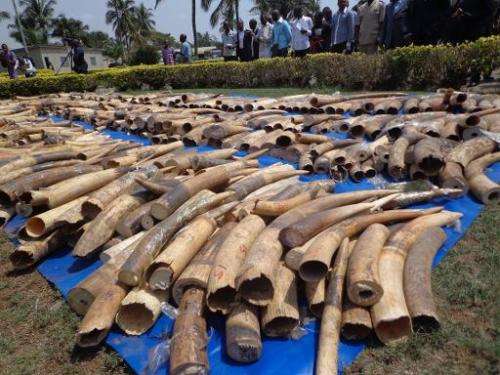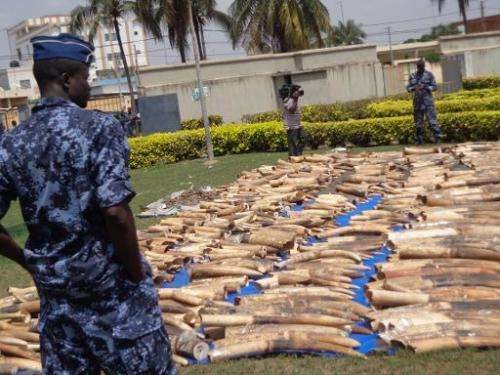Togo goes high-tech in crackdown on ivory smuggling

Togo has gone hi-tech in its crackdown on ivory smugglers, employing DNA testing to determine the origin and age of contraband tusks and expose those at the heart of the illegal trade.
Some 4.5 tonnes of ivory was confiscated in the tiny West African nation between August 2013 and January this year, leading to the arrest of 18 people, according to the government.
The biggest seizures were on January 23 and 29 at the port in the capital, Lome, where police discovered some 3.8 tonnes of ivory in containers bound for Vietnam.
To dismantle the smuggling network, the authorities have turned to science.
"DNA tests were carried out from February 27 to March 8 on a sampe of 200 tusks from the consignment seized in 2013 and 2014 by a local team of specialists supported by experts from Interpol headquarters," commissioner Charles Minpame Bolenga, who runs the global law enforcement agency's bureau in Lome, told AFP.
"Analysis was then carried out at a laboratory in Washington."
According to Bolenga, the results have allowed Togolese police to determine the origin of the tusks as well as the age of the elephants killed.
The first results indicated that the consignment of ivory seized in 2013 came largely from Ivory Coast, Ghana, Guinea and Liberia as well as Cameroon, Congo, Gabon, the Central African Republic and the Democratic Republic of Congo, he added.
"We are still waiting for the results of the tests carried out on the biggest seizures conducted at the port of Lome in January this year," he said.

"We will share the results of this analysis with all the concerned countries in order for them to better protect their elephants because at the moment a single country can't effectively lead the fight."
Last year, more than 700 kilogrammes of ivory were discovered in a shop in Lome belonging to Emile N'Bouke, a 58-year-old Togo national.
He is currently on trial in the capital alongside three other suspected traffickers. The verdict in the case is expected this week.
Others arrested as part of the crackdown are scheduled to appear in court before the end of next month, one of the judges involved in the case said.
Scanning and spot-checks
Elephants, the world's largest land mammal, are one of Africa's biggest tourist attractions and are found across the continent.
But numbers have fallen from 10 million in 1900 and 1.2 million in 1980 to about 500,000 currently, according to conservation groups.
Trade in ivory was banned in 1989 under the Convention on International Trade in Endangered Species of Wild Fauna and Flora (CITES).
CITES and other animal protection groups have warned that as many as 20 percent of the continent's elephants could disappear within a decade if current poaching rates are not tackled.
An estimated 22,000 elephants were killed illegally in Africa in 2012, the groups said.
Demand for tusks, particularly in Asia for decorative purposes and use in traditional medicines, has fuelled a lucrative illicit trade thought to be worth up to $10 billion (7.2 billion euros) a year.
The proceeds are said often to fund militia and rebel groups.
The authorities in Indonesia, China and Hong Kong alerted their counterparts in Togo two years ago about Lome being a trading post in the smuggling after a number of seizures in Asia.
Since then, Togo has stepped up its export controls and all containers leaving the port are scanned closely, according to a customs official.
Unannounced spot-checks are also carried out in shops in the capital and in the country's major cities.
© 2014 AFP




















